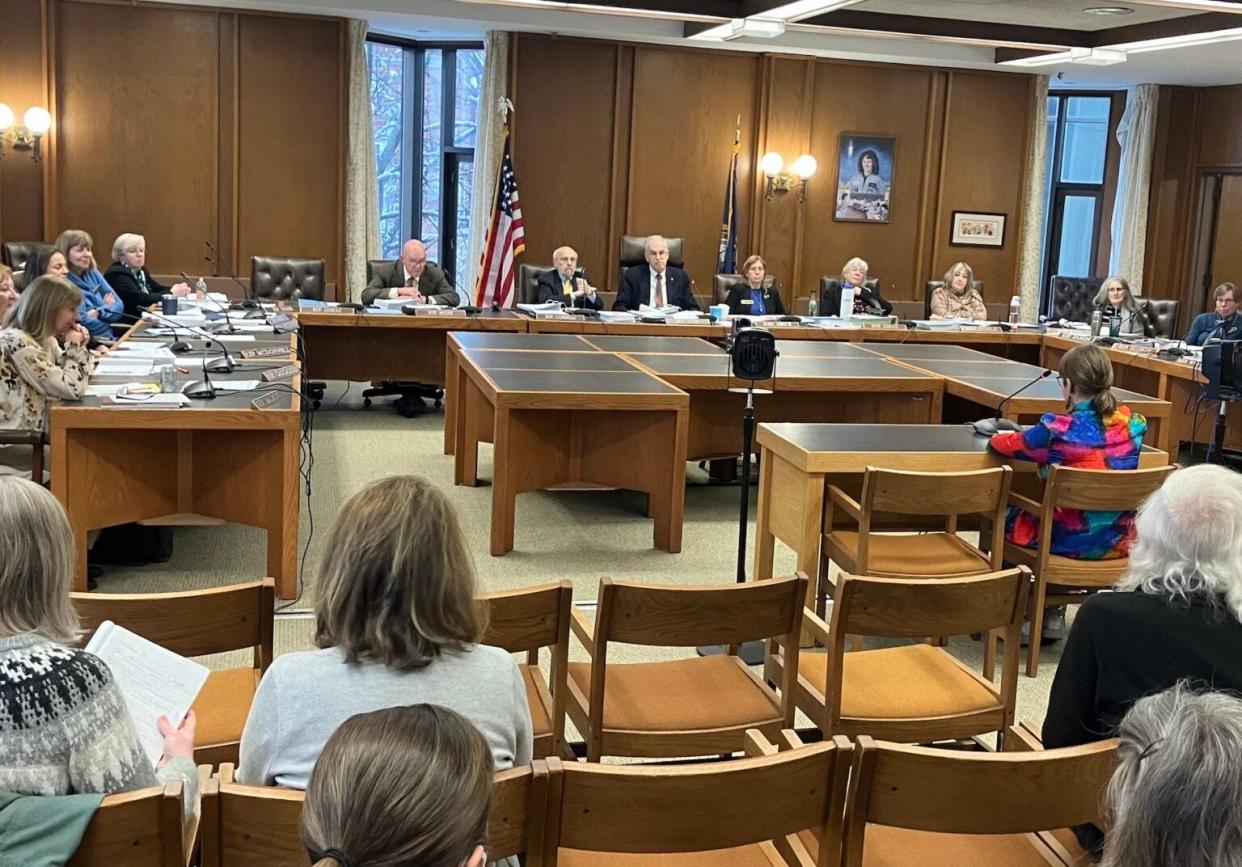‘I am female’: NH transgender students fight back against sports ban bill
First-grader Iris Turmelle didn’t have the words to come out as a transgender girl to her parents — nor a lot of time, frankly. But she had a blanket. So she fashioned a skirt with it, tromped down the stairs, and made every attempt to head off to school.
It was a daring but unsuccessful ploy, her mom, Amy Manzelli recalls now. But it was also a wake-up call. Manzelli at the time didn’t know any parents of transgender children. But she knew something was happening with her child. And after a discussion with Iris, a weekend shopping trip at Target, and a conversation with a teacher, Iris began arriving at school with new clothes and a new identity.
Seven years later, Iris, now 14 and an eighth-grader, has faced a whirl of environments few children ever see. There were the multiple hospital visits where she received examination and then guidance, first in New Hampshire and then at the Boston Children’s Hospital. There was the New Hampshire district courtroom, where she finalized the necessary maneuvers to change her birth certificate from male to female.

And on Monday, there was the House Education Committee, where Iris arrived to speak out against legislation that would bar transgender children like her from certain sports. Walking to the microphone, decked out in a splashy multicolored coat and sparkly sequined boots, Iris moved quietly, commanding the room.
“My name is Iris Turmelle,” she said. “I am an eighth-grader and a trans girl from Pembroke. This is who I am, and nothing can change who I am.”
The testimony came in a year with no shortage of state bills regulating gender.
House Bill 1205, titled the “fairness in women’s sports act,” would require that all interscholastic or intercollegiate sports teams be designated either “male,” “female,” or “coed,” and states that those that are designated for “females,” “women,” or “girls” would not be open to those whose biological sex at birth is male.
The bill defines “biological sex” as “an individual’s physical form as a male or female” and bases that determination “on the individual’s reproductive biology and genetics (chromosomes) at birth.” It also prohibits any athletic association, government entity, or licensing organization from opening any investigation or entertaining any complaint against a school that has separate teams for female players.
The legislation has a counterpart in the Senate: Senate Bill 375 would block students of the “male sex” from female sports teams, female bathrooms, and female locker rooms, defining sex as “the biological state of being female or male, based on an individual’s nonambiguous sex organs, chromosomes, and endogenous hormone profile at birth.”
And it joins other bills seeking to change the laws around gender identity in public spaces. The House will vote again Thursday on House Bill 396, which would amend the state’s anti-discrimination laws to allow public facilities such as schools to enforce separation of bathrooms and locker rooms based on biological sex.
Supporters say that the efforts are driven by safety concerns.
“Our biological females in New Hampshire need protection and safety in sports,” said Rep. Louise Andrus, a Salisbury Republican and the sponsor of the bill.
Iris’ breakthrough
Iris doesn’t remember when she first felt she identified as a girl. “It’s always felt like I was in the wrong skin, kinda,” she said.
Her mom remembers one early sign: The toy Hess trucks. Every year, Iris’ grandmother bought her the green and white model trucks, and every year, Iris said thank you but left them alone.
After the blanket skirt attempt, Manzelli was intentional: She didn’t want to steer her child in any direction. And if her daughter was transgender, she didn’t want to make her feel uncomfortable.
The breakthrough came after Manzelli brought home a number of books to read aloud together – some that featured transgender characters, and some that didn’t. They didn’t discuss the books. But the next morning, Iris had an announcement.
“She said, ‘Mom, I’m tra –, I’m tra –,’” Manzelli recalled. “She couldn’t say the word. And I said, ‘Are you trying to say transgender?’ ‘Yes! I’m transgender.’”
Manzelli, her heart fluttering, kept her emotions level. “My reaction was like, ‘OK, thanks for letting us know. What would you like for breakfast?’” she said.
The first part of that new reality was not so difficult. The hospitals were supportive and understanding, with Iris’ pediatricians beginning the process at that age with clarifying questions and conversations. And the birth certificate amendment process – which Manzelli and her husband Chad Turmelle began in 2019 – was also surprisingly smooth, she said.
But the other part has been bumpier: school. And it’s an area where Manzelli has much less control.
Iris has lifelong friends who are supportive, even though she prefers to keep much of her transition private. But she also has encountered bullies – those who remember her before she transitioned and have held it against her. Amy and Chad have filed bullying complaints with the school and have had varying levels of response. Early on, the school appeared slow to act; recently, the school has undertaken proactive investigations, Manzelli says.
Throughout her time in school, Iris has played sports, first on the town soccer team and then with Girls On the Run, an exercise program that seeks to empower girls with leadership skills. Neither team has caused her any problems, she said. And no one has ever questioned who she is.
“It was fun,” she said. “Besides the running part.”
Legislative divide
Supporters of the school sports bill say they are not trying to target trans students but are instead looking for fairness. In the crammed committee room Monday, a string of supporters raised concerns that students who were born biologically male will dominate female sports competitions with higher testosterone, stronger muscles, and different body structures.
“I just want to say: I’m not anti trans, and I don’t like any kind of prejudice against anyone,” said Betty Gay, a former Republican lawmaker from Salem. “But the reason I’m here supporting this bill is that the best male athletes will always be the best women athletes. And it’s only fair to keep level playing field.”
Stephen Scaer, of Nashua, also said his support of the bill was based in physiology.
“The problem is that bodies compete, not gender identities,” he said. “Our current policies right now are teaching young women that they’re second-class citizens whose needs are subordinate to male needs and desires.”
But some critics of the bills counter that those concerns are unfounded, pointing to research suggesting the majority of transgender female students do not perform better than their cisgender female peers. Jennifer Smith, a transgender woman from Pembroke and former physician, said that any transgender girl who had begun hormone therapy before puberty would likely already have decreased testosterone, putting her on the same playing field as her peers. And Smith noted that some biologically female girls have higher-than-normal testosterone levels, but would still be allowed to compete.
“If you want to find a way to advantage girls that’s great,” said Smith. “But please don’t do that at the expense of transgender girls. They do not have either skeletal or hormonal advantages because they started out with an X and a Y chromosome. It’s just not true.”
Others argue the language in the bill conflicts with Title IX, a portion of federal civil rights law that bars discrimination on the basis of sex in U.S. schools, and say that it could open the state up to a federal lawsuit if passed.
“If New Hampshire law and federal law are in conflict, that’s going to create a lot of problems hurting after schools again for the Human Rights Commission,” said Chris Erchull, staff attorney for GLBTQ Legal Advocates & Defenders.
And some say enforcement could put schools in an impossible position. The bill does not dictate how a school must prove that a child is not biologically female, a scenario opponents say is even more challenging if the child has already changed their birth certificate.
“How are we going to determine what someone’s biological sex is?” said Deb Howes, president of the American Federation of Teachers New Hampshire, a teachers union. “They might not be out to their school community. And we also have constitutional protection for privacy. Do you really want the schools making intrusive inquiries into someone’s past or medical situation?”
To Iris, the question of her gender has already been long decided.
“Legally, I am female,” she told lawmakers Monday. “I have a female name. I have a birth certificate with my female name and gender marker. I have a court order that says I’m female and orders my female name. My passport says I’m female and has my female name. My insurance card says I’m female and has my female name. My name is Iris, and I am female.”

This story was originally published by the New Hampshire Bulletin.
This article originally appeared on Portsmouth Herald: NH transgender students fight back against sports ban bill
